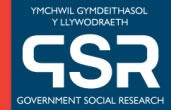Research exploring ways to improve the Disability Confident Employer Scheme in Wales - Co-productive approach
We worked with the Disability Rights Taskforce to conduct research into the Disability Confident Employer Scheme. We wanted to test how we co-produce research to support disabled people.
This file may not be fully accessible.
In this page
Co-production aims
The co-production team produced an overall vision for the research project, the coproduction approach and the evaluation. Co-production was agreed as ‘an approach to working together in equal partnership for equal benefit’ and a range of principles to aid working together amongst team members were agreed.
The shared ambitions were to learn how to produce GSR research together, where the learning would be used to improve the quality and use of evidence to inform decisions affecting disabled people in the future. It was a prototyping experiment to test the limits to which a GSR report could be coproduced. The extent to which ambitions were achieved will be the topic of a separate evaluation report and are not included in this report.
The research co-production team
The team combined lived experience of being disabled by barriers with expertise in disability rights and social research (both academic and Government) and brought together DRTF Working Group Chairs and Welsh Government officers:
- the Chairs represented a wealth of lived experience of being disabled by barriers, knowledge and expertise (including academic expertise in employment inequalities and disability) and had chaired DRTF Working Groups covering the topics of Employment and Income, Independent Living and Health, Independent Living and Social Care, Housing, Access to Services, Access to Justice and Travel
- a PhD Student who was associated with the DRTF Employment and Income Working Group Chair and independently researching the same topic also joined the team
- the DRTF Policy lead who maintained connections between research projects and the Disabled People’s Rights Plan
- a minimum of three Welsh Government social researchers were dedicated to the co-production team throughout, including some with lived experience of being disabled by barriers
- a Principal Researcher supported co-production throughout and had responsibility for the final evaluation
- the Head of the Equality, Race and Disability Evidence Units had oversight from project inception and was fully involved in the co-production from the point the research focus had been agreed
Research aims
The aim of the research was to iteratively co-produce primary evidence and use it to explore the DRTF Working Group recommendation, through involving:
- the co-production team and its initial scoping discussions
- representatives of Disabled people (including DPO’s and IG’s)
- representatives of employers
- Welsh Government policy officers
- representatives of trades unions
How the research was produced
The co-production team set out to work as co-productively as possible to scope, co-design and co-plan the research, develop research tools and to co-analyse the data. Welsh Government researchers drafted the reports and quality assured these to GSR standards before being offered for review by the co-production team.
The extent to which decisions were co-produced varied at different stages of the project. Some decisions were reserved by Welsh Government where it had responsibilities to uphold. For example, statutory data protection responsibilities or professional GSR standards such as ethical responsibilities relating to confidentiality of findings before publication.
Co-production is an iterative process. The co-production involved two pieces of research and decisions taken about the fieldwork design impacted on resources available to adequately deliver on other research objectives. This is explained in more detail in the methodology section and will be explored further through the project evaluation. The evaluation will consider to what extent the research was coproduced across the different stages of the two research prototype projects.
Working together as a team of experts by experience and academic or Government social researchers (some were both) added to the quality of the research, for example:
- knowledge about the research topic was pooled and the research built upon knowledge accrued in the DRTF Working Group and the PhD Student’s independent research
- the lens of lived experience was applied to development of the research tools, co-facilitation of focus groups and analysis of focus group data
- assumptions about disabled people were challenged and opportunities to do things differently were highlighted
- research and reports were co-designed in attempting to deliver in line with the principles of the social model of disability
- joint efforts made to select and recruit participants in focus groups
Contact details
Report author: Equality, Race and Disability Evidence Units
Views expressed in this report are those of the researchers and not necessarily those of the Welsh Government.
For further information please contact:
Equality, Race and Disability Evidence Units
Knowledge and Analytical Services
Welsh Government
Cathays Park
Cardiff
CF10 3NQ
Email: EqualityEvidenceUnit@gov.wales
Social research number: 57/2025
Digital ISBN: 978-1-83715-748-8

